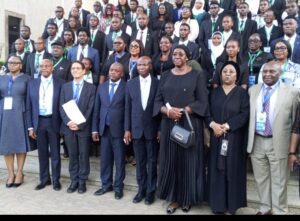

By Correspondent in Abuja.

Judges of the Federal High Court in Abuja; Justices Binta Nyako, Joyce Abdulmalik, James Omotosho, and other officials of Nigeria Civil Aviation Authority (NCAA), Aviation Working Group (AWG) and students of the University of Lagos and University of Benin shortly after the event yesterday in Abuja.

The Nigeria Civil Aviation Authority (NCAA) and the judiciary have joined forces to enhance understanding of the laws guiding contractual engagements in the country’s aviation industry.
This partnership was highlighted at the grand finale of the International Cape Town Convention (CTC) Moot Court, held on Wednesday evening at the Federal High Court, Abuja, under the auspices of the CTC Academic Project.
The Director-General of NCAA, Captain Chris Najomo, represented by the Director of Operations, Licensing and Training, Captain Donald Spiff, called for stronger judicial support in promoting awareness of the laws, particularly the Cape Town Convention (CTC).
Najomo explained that the CTC,comprising the Cape Town Convention on International Interests in Mobile Equipment 2001 and its Aircraft Equipment Protocol,has significantly improved Nigeria’s global standing with aircraft lessors and the aviation business community.
According to him, the moot court initiative was designed to familiarise students, academics, and judges with the practical applications of the CTC through simulated judicial proceedings based on complex, hypothetical aviation-related cases.
He recalled that, in the past, many aircraft manufacturers and leasing firms were reluctant to transact with Nigeria, but the ratification of the CTC has restored confidence.
“Through the efforts of the Honourable Minister of Aviation and Aerospace Development, Mr. Festus Keyamo, SAN, Nigeria is now in the good books of global aviation stakeholders.
This enlightenment programme is a clear message that Nigeria is open and ready for business”
Najomo stated. “
He commended the outstanding performance of participating students, noting that their brilliance and dedication reflected the nation’s intellectual capacity and potential.
Speaking at the event, Jeffrey Wool, Secretary-General of the Aviation Working Group (AWG) and Co-director of the CTC Academic Project, expressed delight at the successful hosting of the first Nigerian International CTC Moot Court.
Wool described the CTC as a vital international treaty ratified by Nigeria, adding that the moot court served as an avenue to expose students and the legal system to its provisions.
He further noted that the CTC carries significant economic implications for the country, revealing that the Federal High Court has recently adopted a practice direction for handling CTC-related cases.
Our correspondent reports the final session, held in Court 3, featured a simulated courtroom exercise between law students from the University of Benin and the University of Lagos, before a three-member panel of Federal High Court judges comprising Justices Binta Nyako (presiding), Joyce Abdulmalik, and James Omotosho.
Osauyi Agbonwaneten of the University of Benin emerged as the best advocate, followed by Michael Adedayo of the University of Lagos, Falodun Daniel (University of Lagos) placed third, while Bawi Testimony came fourth.
Eighteen universities representing Nigeria’s six geopolitical zones took part in the preliminary rounds of the competition, from which the University of Benin and University of Lagos advanced to the grand finale.
The event was organised by the Federal Ministry of Aviation and Aerospace Development and the NCAA, with support from the Aviation Working Group (AWG).
Edited by Dada Ahmed.

